DSM-5 and the ICD-10: Continuing Customer InquiriesWe know that most behavioral health providers utilize the Diagnostic and Statistical Manual of Mental Disorders
to diagnose their patients. We also are aware that many of you believe
that you use DSM diagnoses for billing. It is very important that you
begin to understand that you actually use ICD codes to get paid for the
services you render. Most of the time, the DSM and ICD-9 codes are
identical. Sometimes, they are not the same and your claim is rejected.
DSM-5 and ICD-10 change everything.
The Diagnostic and Statistical
Manual of Mental Disorders, Fifth Edition
(DSM-5) was released on May 18, 2013. While it is controversial
in its own right based on some of its content, the DSM-5 promises to add confusion to payment
processing for behavioral health and chemical dependency providers. As
we move toward the October 2014 implementation deadline for the ICD-10,
providers find themselves presented with conflicting information. On
the one hand is the new diagnostic manual with its new diagnoses and
criteria; on the other hand is the requirement to move to the ICD-10
for payment processing. We hear the following question often:
Question:
When will SOS include the DSM-5 in products?
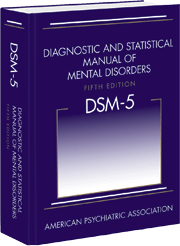
Answer:
We
will not license the DSM-5 from American Psychiatric Association (APA)
for use in our products. The codes associated with the DSM-5 are ICD-9
codes through September, and ICD-10 codes thereafter. If you purchase
the DSM-5 manual, you will see that each disgnosis has the two ICD
codes next to it. You use the DSM descriptive information to make your
diagnosis, but what you enter as the diagnosis code to go out in your
claims will be an ICD code. THERE ARE NO DSM-5 CODES APART FROM THE ICD
CODES REFERENCED FOR EACH DIAGNOSIS IN THE DSM-5.
We have
provided a pick list for DSM-5 in our latest update, as well as
retaining the DSM-IV Axis I and II codes, but we are not populating the
DSM-5 list because the needed codes are already available in the ICD
lists. If it makes you feel better to add the codes you use to the
provided DSM-5 list, please do so. In fact, we strongly suggest that
you completely ignore
all three DSM lookups in SOS. Note that if you enter many DSM-5
diagnoses in the list, using ICD-9 codes now, you will have to go
through and replace the codes with the APA-specified ICD-10 code on
October 1. We do not see much purpose in that. APA expects you to
develolp your diagnosis based on the description and criteria in the
DSM-5 manual, then use the ICD code the DSM-5 tells you to use for that
diagnosis when billing and when communicating information to other
providers.
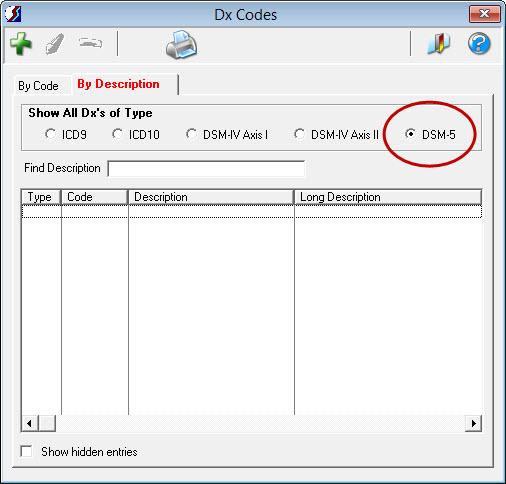
As we have said previously, most DSM-IV codes match ICD-9 codes. In some cases a claim will be
rejected by a payer because you have not used a specific enough code.
This usually happens when you have used a generic DSM code with no
decimal characters; the payer wants the additional one or two
characters that the ICD codes include. Except for some small,
niche
managed-care administrators, the health insurance industry is
standardized on ICD coding. In fact, ICD-9 diagnostic codes are one of
the standardized code sets required by
the HIPAA legislation
since at least 2004. Currently, and happily, for those of you who are
using DSM
documentation to determine your patients' diagnoses, the DSM codes
overlap with ICD-9 codes almost completely. As a result, when your
DSM-coded claim reaches the payer, it has been processed in accordance
with adjudication rules that are actually based on ICD-9 codes. With
ICD-10, that concordance between codes disappears! Please download American Psychiatric
Association's document on DSM5, ICD-9 and ICD-10 for a fuller
understanding.
This is part of what the American Psychiatric Association says in the document
linked above:
"On October 1, 2014, the United
States adopts ICD-10-CM as its standard coding system. How will
diagnoses be coded then?
DSM-5 contains both ICD-9-CM
codes for immediate use and ICD-10-CM codes in parentheses. The
inclusion of ICD-10-CM codes
facilitates a cross-walk to the new coding system that will be
implement-
ed on October 1, 2014 for all
U.S. health care providers and systems, as recommended by the Centers
for Disease Control and
Prevention’s National Center for Health Statistics (CDC-NCHS) and the
Centers
for Medicare and Medicaid
Services (CMS)."
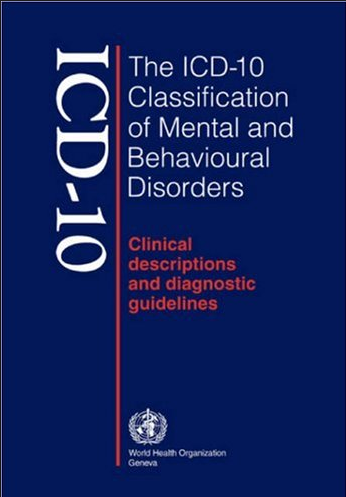 Since many providers do not buy their own copy of the DSM, choosing to
work from a list of codes rather than the manual, they will not be in
possession of the cross-walk to ICD-10 codes. The
transition to ICD-10 codes removes the overlap between DSM and
ICD
completely. In fact, the DSM-5 has no codes of its own. The older DSM-IV code books do not match up with ICD-10
codes, so you will have
to change from the codes you are currently using to the appropriate
ICD-10 codes starting on October 1, 2014 in order to receive insurance
payment. The recently released DSM-5 code books sold by American
Psychiatric Association include appropriate ICD-10 codes, in
parentheses, next to each diagnosis description, so purchase of those
resources may be of some assistance to you in selecting the correct
codes to put on your claims starting in October, 2014. That said, your
best resources for ICD-10 diagnosis coding to assure rapid insurance
payment will be ICD-10 code books, not DSM-5 books.
Since many providers do not buy their own copy of the DSM, choosing to
work from a list of codes rather than the manual, they will not be in
possession of the cross-walk to ICD-10 codes. The
transition to ICD-10 codes removes the overlap between DSM and
ICD
completely. In fact, the DSM-5 has no codes of its own. The older DSM-IV code books do not match up with ICD-10
codes, so you will have
to change from the codes you are currently using to the appropriate
ICD-10 codes starting on October 1, 2014 in order to receive insurance
payment. The recently released DSM-5 code books sold by American
Psychiatric Association include appropriate ICD-10 codes, in
parentheses, next to each diagnosis description, so purchase of those
resources may be of some assistance to you in selecting the correct
codes to put on your claims starting in October, 2014. That said, your
best resources for ICD-10 diagnosis coding to assure rapid insurance
payment will be ICD-10 code books, not DSM-5 books.
|
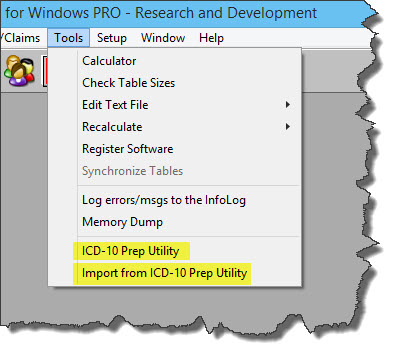
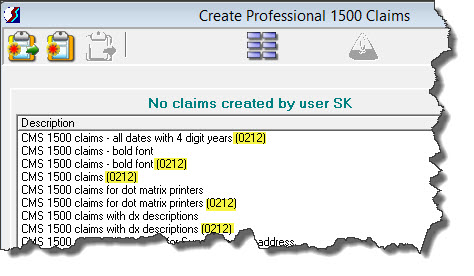


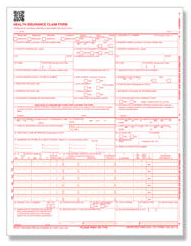
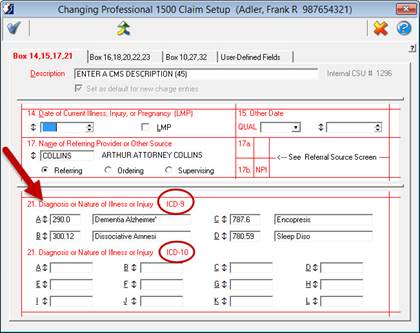
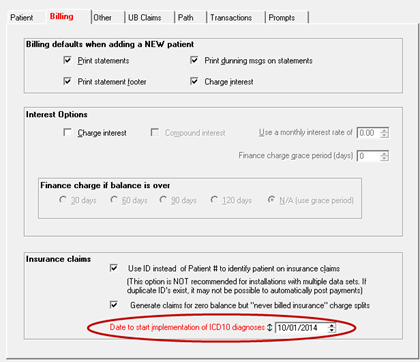
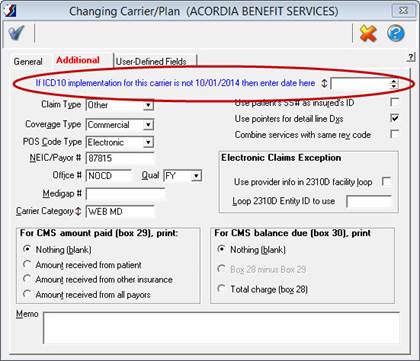
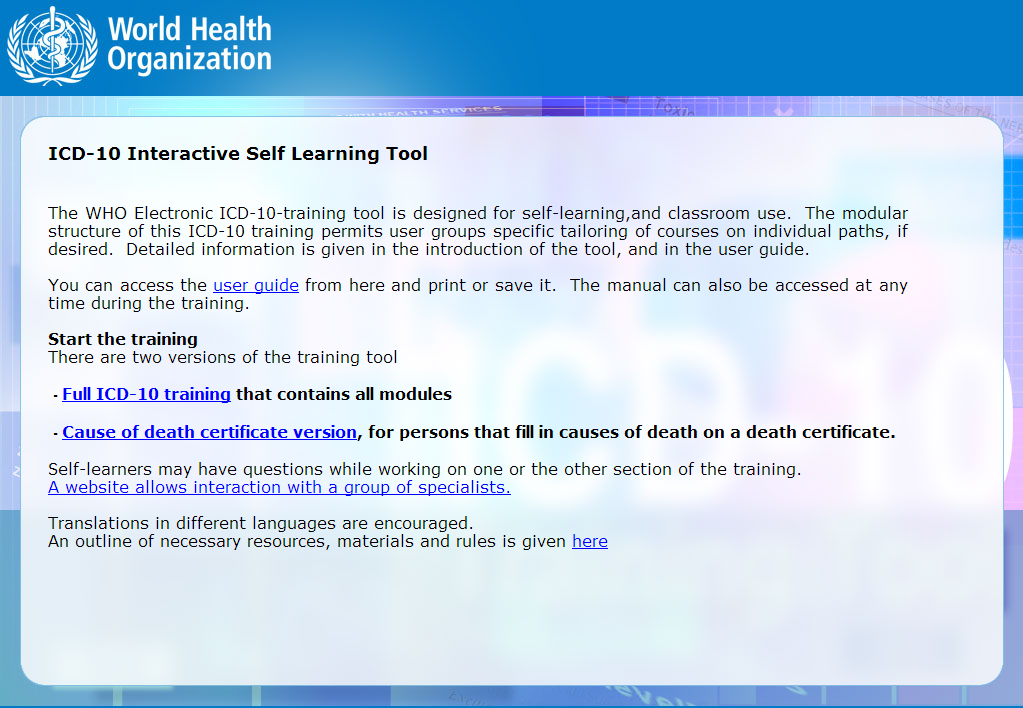


 Since many providers do not buy their own copy of the DSM, choosing to
work from a list of codes rather than the manual, they will not be in
possession of the cross-walk to ICD-10 codes. The
transition to ICD-10 codes removes the overlap between DSM and
ICD
completely. In fact, the DSM-5 has no codes of its own. The older DSM-IV code books do not match up with ICD-10
codes, so you will have
to change from the codes you are currently using to the appropriate
ICD-10 codes starting on October 1, 2014 in order to receive insurance
payment. The recently released DSM-5 code books sold by American
Psychiatric Association include appropriate ICD-10 codes, in
parentheses, next to each diagnosis description, so purchase of those
resources may be of some assistance to you in selecting the correct
codes to put on your claims starting in October, 2014. That said, your
best resources for ICD-10 diagnosis coding to assure rapid insurance
payment will be ICD-10 code books, not DSM-5 books.
Since many providers do not buy their own copy of the DSM, choosing to
work from a list of codes rather than the manual, they will not be in
possession of the cross-walk to ICD-10 codes. The
transition to ICD-10 codes removes the overlap between DSM and
ICD
completely. In fact, the DSM-5 has no codes of its own. The older DSM-IV code books do not match up with ICD-10
codes, so you will have
to change from the codes you are currently using to the appropriate
ICD-10 codes starting on October 1, 2014 in order to receive insurance
payment. The recently released DSM-5 code books sold by American
Psychiatric Association include appropriate ICD-10 codes, in
parentheses, next to each diagnosis description, so purchase of those
resources may be of some assistance to you in selecting the correct
codes to put on your claims starting in October, 2014. That said, your
best resources for ICD-10 diagnosis coding to assure rapid insurance
payment will be ICD-10 code books, not DSM-5 books.
